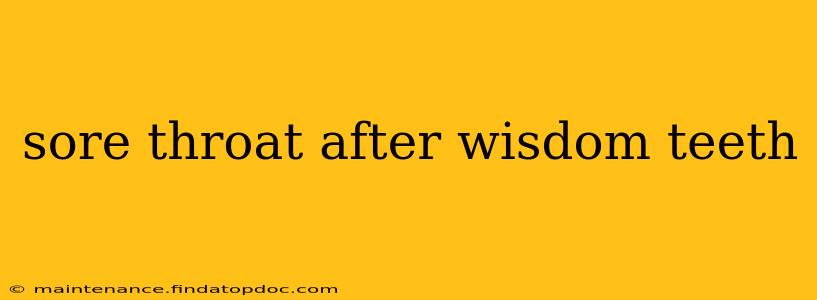Having your wisdom teeth removed is a significant oral surgery, and while the focus is often on the extraction sites, many patients experience a sore throat afterward. This post will explore the reasons behind this common post-operative discomfort, offering practical advice on prevention and effective relief strategies. We'll address frequently asked questions to ensure you're well-informed and prepared.
Why Do I Have a Sore Throat After Wisdom Teeth Removal?
A sore throat following wisdom teeth extraction is a relatively common occurrence, stemming primarily from the surgery itself. Several factors contribute:
- Irritation from the surgical instruments: During the procedure, the surgeon uses instruments that may inadvertently brush against the throat, causing minor irritation and inflammation.
- Swelling and inflammation: Post-operative swelling is normal. This swelling can extend to the throat and surrounding tissues, leading to a feeling of tightness and soreness.
- Mouth breathing: After surgery, patients often breathe through their mouths, drying out the throat and making it more susceptible to irritation and soreness.
- Bleeding: While typically minimal, bleeding during and after surgery can irritate the throat.
- Infection: In rare cases, a sore throat might indicate an infection. This requires immediate medical attention.
How Long Does a Sore Throat Last After Wisdom Teeth Removal?
The duration of a post-wisdom tooth extraction sore throat varies, generally lasting a few days to a week. However, if the soreness persists beyond a week, or is accompanied by other symptoms like fever or severe pain, you should consult your oral surgeon or dentist.
What Can I Do to Relieve a Sore Throat After Wisdom Teeth Removal?
Managing a sore throat post-surgery focuses on soothing the irritated tissues and preventing further irritation. Here are some effective strategies:
- Saltwater gargles: This is a simple yet effective home remedy. Dissolve 1/4 to 1/2 teaspoon of salt in 8 ounces of warm water and gargle gently several times a day. Avoid forceful gargling, as this can dislodge blood clots.
- Rest: Adequate rest allows your body to heal more effectively.
- Hydration: Staying well-hydrated is crucial for healing. Sip on water, clear broths, or other non-irritating fluids regularly. Avoid acidic drinks like orange juice.
- Over-the-counter pain relievers: Your dentist or oral surgeon may recommend pain relievers like ibuprofen or acetaminophen to manage pain and inflammation. Always follow their instructions.
- Avoid smoking and alcohol: These substances can interfere with the healing process and irritate the throat.
- Humidifier: A humidifier can add moisture to the air, preventing further dryness and irritation in your throat.
- Warm compresses: Applying a warm compress to the neck can help soothe the sore throat and reduce inflammation.
Is a Sore Throat After Wisdom Teeth Removal a Sign of Infection?
While a mild sore throat is common, a severe or persistent sore throat, especially accompanied by other symptoms like fever, chills, swelling that increases rather than decreases, or pus, could indicate an infection. Seek immediate medical attention if you experience these symptoms.
When Should I Call My Dentist or Oral Surgeon After Wisdom Teeth Removal?
Contact your dentist or oral surgeon immediately if you experience:
- Excessive bleeding: Bleeding that doesn't stop after several hours or soaks through multiple gauze pads.
- Severe pain: Pain that isn't controlled by prescribed medication.
- High fever: A fever above 101°F (38.3°C).
- Increased swelling: Swelling that worsens instead of improving.
- Difficulty breathing or swallowing: These are serious signs and require urgent medical attention.
- Pus or foul odor coming from the extraction site: This could be a sign of infection.
This information is for general knowledge and does not constitute medical advice. Always follow the specific post-operative instructions provided by your oral surgeon or dentist. If you have any concerns, contact your healthcare provider.
